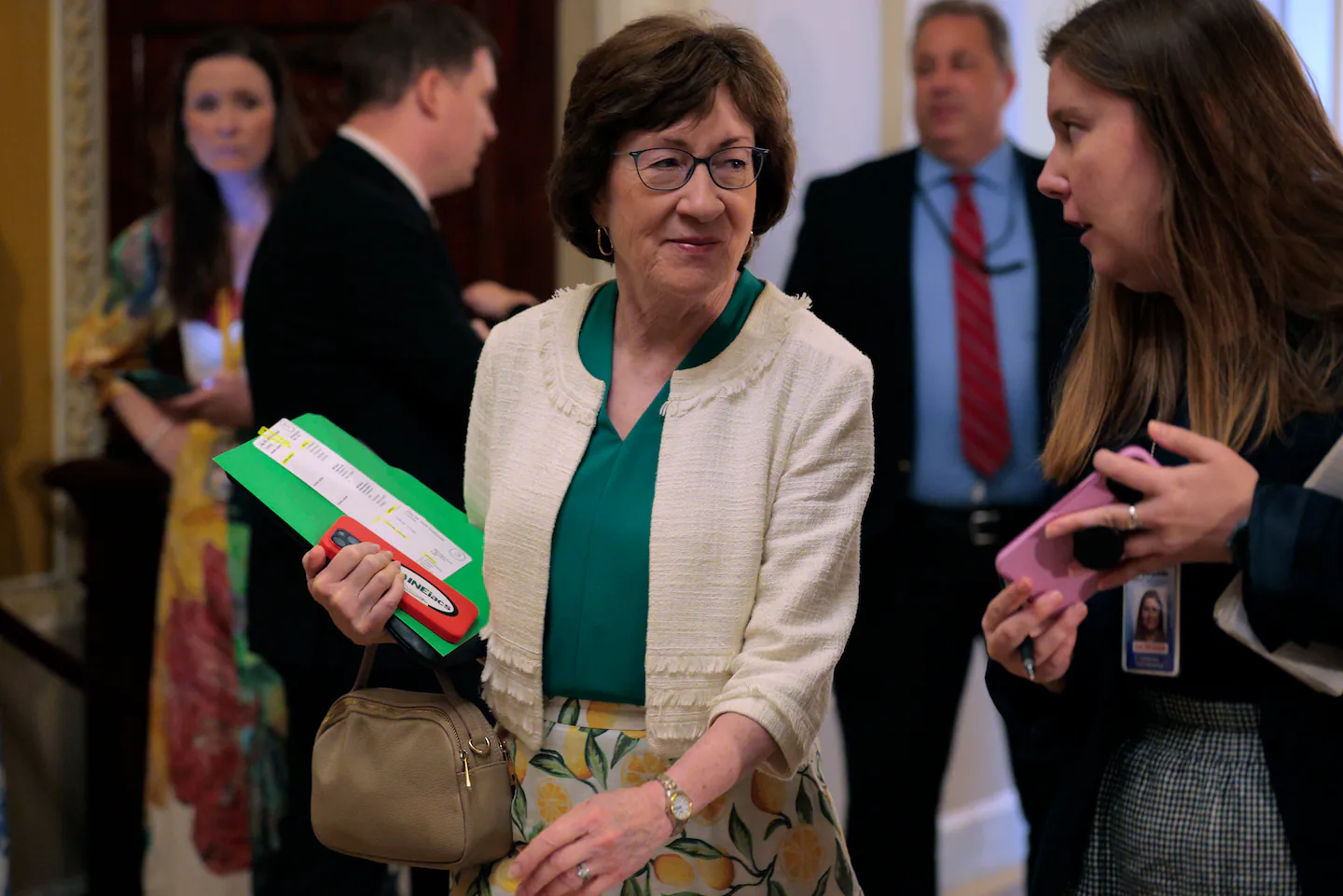Copyright The Boston Globe

It was Sara Gideon, the former speaker of the Maine House of Representative and the top recruit of Senate Minority Leader Chuck Schumer that year. She and outside Democratic allies sought to focus the race on Collins’s role in national politics, spending tens of millions of dollars to paint her as a feeble enabler of President Trump and GOP leadership. Democrats believed the backlash nationally to Trump and Collins would be enough to power that message, despite misgivings with Gideon as a candidate, and public polls reflected their confidence. Instead, Collins won by 9 points. Whether they remember Gideon, Maine Democrats are still contending with the aftermath of that race as they pick a new challenger to Collins for 2026. Many of those discussions boil down to a simple question: Who can — finally — beat Collins? The two leading options are virtual opposites. Platner, 41, is a gruff oyster farmer and Iraq War veteran with a combative populist style, who has drawn massive crowds and considerable controversy. Janet Mills, 78, is a sitting two-term governor with a long list of legislative achievements and Schumer’s backing who is comfortable talking back to Trump in person but has a more understated campaign style. The 2020 campaign offers something of a Rorschach test for Democrats today. Backers of Platner say an establishment candidate backed by D.C. was not the answer to Collins before and that Democrats need to try something totally different, such as Platner’s outsider, populist message. But Mills supporters say 2020 proved that running an untested challenger against a heavyweight such as Collins is doomed to fail. In that argument, it would be the inexperienced Platner who is more similar to Gideon — who only ever represented a small legislative district — than Mills, who has won statewide twice by impressive margins. Both candidates, though, appear to have learned from 2020 that a campaign message centered squarely around firing Collins is not enough. In Maine, voters are worried about quality of life and cost of living. “It’s about showing a different, better vision,” said state Senator Mike Tipping, a Democrat from Orono, who has not endorsed any candidate. “Everyone across the country has thoughts on Platner and Mills and everything else — what it says for the Democratic Party and the nation or Donald Trump,” added Tipping. “In-state, we’re just thinking of who we want as our senator.” The campaign is not without criticism of Collins, especially by Platner. One of the loudest applause lines he got at his town hall in Damariscotta on Oct. 27 came after he declared Collins’s “charade of fake moderation has worn thin.” But Platner offers plenty of criticism for Democrats, too, as he builds his campaign around reworking the entire political system. Platner spokesman Joe Calvello told the Globe that “you have to be for something right now — you can’t just be running on, ‘Susan Collins bad’ ... that’s failed in Maine." “We’re going to talk about what Graham is going to do for Maine and the country, and that’s what voters are hungry for,” he said. Mills, who has a longstanding and friendly working relationship with Collins, is so far eschewing harsh attacks on her as she focuses on cost-of-living issues. Indeed, outside backers of Collins are running TV ads in Maine featuring Mills saying recently, “I appreciate everything she is doing.” In response to an inquiry from the Globe, Mills spokesman Scott Ogden criticized Collins’s positions — such as her procedural vote to advance Trump’s “Big Beautiful Bill” (she voted against final passage) and said Mills is running on her record of expanding health care and abortion rights. “The only thing Susan Collins has gotten right is calling Governor Mills a strong candidate to take her on,” Ogden said. A third candidate who has raised money but has not caught on in polls so far, former congressional aide Jordan Wood, has focused on Collins more, undertaking a “Courage, not Concern” tour of town halls. (Collins’s frequent refrain that she is “concerned” by Trump and his administration’s actions has become something of a meme for many anti-Collins liberals.) As in 2020, the stakes of the 2026 Senate race in Maine race carry national significance. Collins is the only incumbent Republican up for reelection in a state Trump lost in 2024, making her a top target for Democrats who need to flip four seats to retake the Senate majority. Without winning here, Democrats are all but certain to fall far short. First elected in 1996, Collins has typically won reelection easily, attracting a broad coalition of voters with her centrist politics and a relentless focus on bringing home federal funding. But in the last decade, she has seen her moderate brand tested, and somewhat tarnished, by her responses to the turmoil of the Trump era, particularly her controversial votes backing his legislation and Supreme Court justices. A hyper-local approach could play to Collins’s strengths again in 2026, particularly given her new role as chair of the powerful Senate Appropriations Committee — though that authority has been somewhat stymied by the Trump administration’s eagerness to bypass Congress’s power of the purse. Collins is still known by supporters and detractors alike as a formidable campaigner. “Susan Collins has only ever lost one race, and she has always run like she’s 10 points behind,” said Garrett Mason, a former Republican state Senate majority leader and close Collins ally. Mason said both Platner and Mills have their strengths, but noting his many controversies, said Platner was “clearly not vetted” and that Collins would “not let Mainers forget” his past social media comments. With respect to Mills, Mason said, “It’s tough for her to get up there and say, ‘I have an issue with Sen. Collins,’ because they have worked together for so long, and said very nice things about each other for so long.” National Republicans are projecting confidence Collins will win a sixth term — which would make her the longest-serving senator in Maine’s history. “With the choice between a failed Schumer-backed governor and a [New York City Mayor-elect Zohran] Mamdani wannabe, Susan Collins is ready to take on whichever partisan extremist Democrats send her way,” said Samantha Cantrell, regional press secretary for the National Republican Senatorial Committee. Public opinion data indicate Collins may be in a more precarious position now than six years ago; most recent polls show Collins’s approval rating underwater. As she prepared for reelection in 2019, some polls showed her popularity faltering, but several affirmed her strong standing. “Democrats enjoy a much better playing field in 2026 than they did in 2020, regardless of who the candidate is,” said Andy Smith, a professor of political science at the University of New Hampshire who oversees the school’s Pine Tree State Poll of Maine voters. Among some Democrats, the sense that either Platner or Mills could beat Collins — or conversely, that both would be underdogs — is pushing some to roll the dice with an electorally untested outsider candidate who reflects their values. “People don’t trust national Democrats to choose the right candidates, because they don’t know Maine,” said Andy O’Brien, communications director for the Maine AFL-CIO, who was speaking in his personal capacity. “It’s much more liberating to vote for someone you feel passionate about, and maybe they’ll have the energy to win.” But Mills certainly knows Maine, and has downplayed Schumer’s role in persuading her to run. While Platner could attract voting blocs Democrats are trying to win back, such as younger, working-class men, Maine is the oldest state in the country on average and has a moderate streak. Mills’s potential to appeal to more centrist Mainers who supported both Collins and Joe Biden in 2020 — an estimated 15 to 20 percent of voters — is perhaps just as important a consideration. As they weigh their options, some Democratic voters are wondering not which candidate can beat Collins, but whether she is at all beatable. “I’d probably vote for someone’s dog to get rid of Susan Collins,” said Rue Brown, a small business owner from Woolwich who attended Platner’s town hall. Asked whether Platner could do it, Brown paused. “I don’t know,” she said. “I really want to say yes.”



